Any female is blessed with a natural nurturing instinct for her babies, but do all mothers have the same love and care for their babies? Well no! You can’t agree with that universally. Because some mother cats tend to eat their babies right after they are born! Gross and evil, right?
Why do mother cats eat their kittens? Such a barbaric act! What if your cat’s one of these, it’s surely going to be heartbreaking and scary, can you prevent it from happening? Scroll down and you will know!
Why do mother cats eat their kittens?
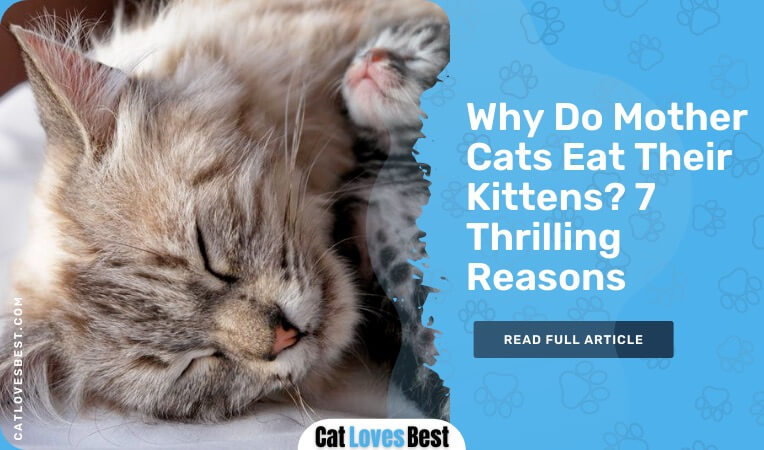
Is It Normal for Cats to Eat Their Kittens?
Though this is an extremely rare event where a cat happens to eat their kitten, it is a normal cat behavior of cats or other animals. Some cats will either eat their entire litter or just one kitten. Scary and gross, right?
Well you know, cats can eat their humans after they die but is eating their kittens the same thing? Why do they do it? Science remains unsure why a cat will do something which we consider barbaric!
So, why do mother cats eat their kittens? Let’s find out!
7 Reasons Why (Sometimes) A Cat Eat Their Babies
When animals eat their babies, it is known as infanticide, so one thing is clear that it’s quite common for family members of the wild animals to eat their own babies than it is in humans.
Science says that it can help benefit the parent animal by increasing their access to limited food resources, providing additional nutrition, and preventing predators.
As well as increasing reproductive success in large cats if a female cat kills a solo kitten to focus on having another, larger litter later on.
Let’s find out the 7 scary reasons why do mother cats eat their kittens?
1. The Kitten Is Stillborn
One of the main reasons why do mother cats eat their kittens even when they are newborn kittens or stillborn kittens. While some cats tend to ignore the dead kitten by completely behaving like they don’t exist, she will not clean then, will lick other kittens but the dead one.
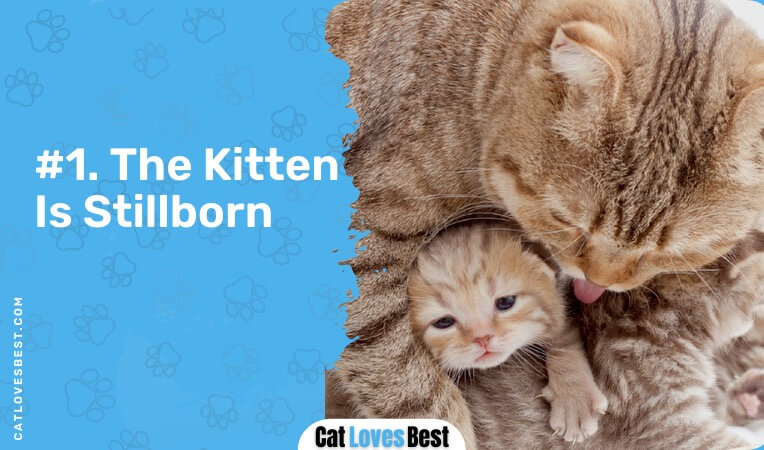
While other cats remove the dead kitten, and just like that some cats will eat their stillborn kitten. One more surprising fact is that cats get nutrients which they will pass on to other kittens while feeding milk.
2. The Poor Kitten Was Deformed, Sick or Had Birth Defects
If your cats have recently given birth to cute little kittens, and you notice that one or two just went missing because they were there before in moving condition, in such case what could be the scenario? Well, cats can give birth to deformed, sick, or kittens with birth defects!
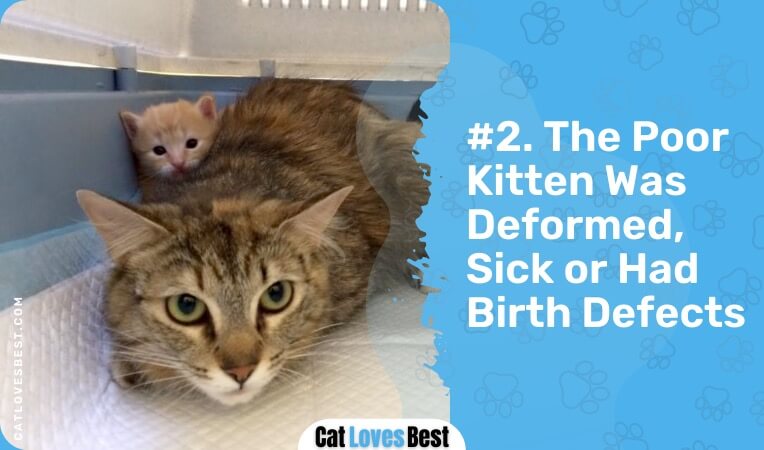
But why do mother cats eat their kittens? So when this is the case the mother cat will assume only one thing which is that her kitten will not survive for a longer period of time.
A dead or weak kitten Can also be a source of attraction for predators, to survive in the wild cats usually remove all the traces of them, by covering their poop, keeping themselves clean by licking so that other wild animals couldn’t easily stalk them.
Well, this might seem so evil but for cats, this is necessary evolutionary behavior for their survival!
The good news is some cats will not eat the kitten with birth defects, but instead, they will remove him from the litter box, ignoring her kittens, won’t feed milk to him. So if you happen to notice such treatment of your cat to any of its kittens, you can simply pick him up and consider hand-rearing options with your vet.
3. If the Cat Is Affected by Environmental Stressors
We know how our cats are super sensitive and extra sneaky when it comes to displaying any emotions.
You must be well versed with this kind of behavior of your cat now, It’s going to get double up when she’s about to give birth, yes your cat is going to get extra sensitive.
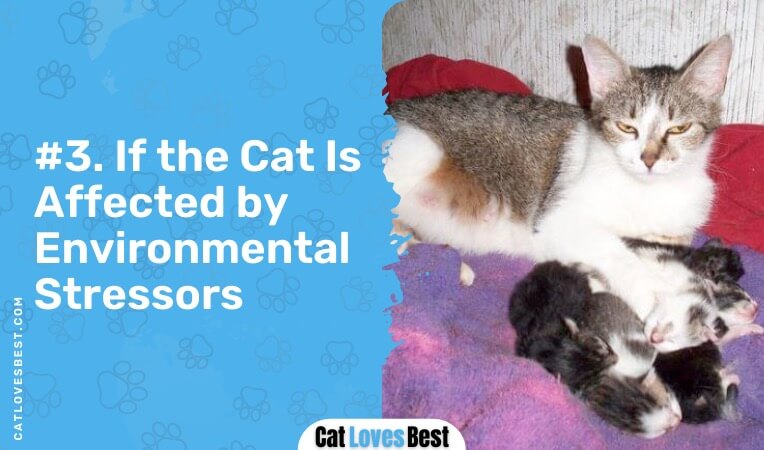
So if your cat is going to give birth, you need to read very carefully whatever we are about to tell you. The environment of your cat when she’s about to give birth is very necessary!
If she’s been bothered with a very loud noise, people crowding over her, sudden change in the background, or changing the setting of her litter box!
All of them can contribute to adding stress to your cat, especially cats with kittens are prone to suffer from high-level stress.
Now, what looks like the concern to us, which make us have a look around the litter box to see if the cats and kittens are safe or not!
Cats take it as a predator behavior and will get threatened even by the friendliest dog! In such a case, she will eat her kittens. So you see how stress is related to how, and why, do mother cats eat their kittens?
What can you do from your end to give your cat a stress-free environment at home:
- Make sure you set your cat’s litter box to such a place which is quite and safe.
- If you are planning to move your cat’s nest don’t move it to a completely new place or frequently moving spots.
- It’s for the best if restrict guest from coming your home until the kittens are old enough.
- If your cat chooses certain spot make sure that you don’t try to relocate her.
4. Merciful Reasons
Cats in the wild sometimes eat their kittens if they feel threatened by other wild animals, this kind of activity is done for the purpose of mercy!
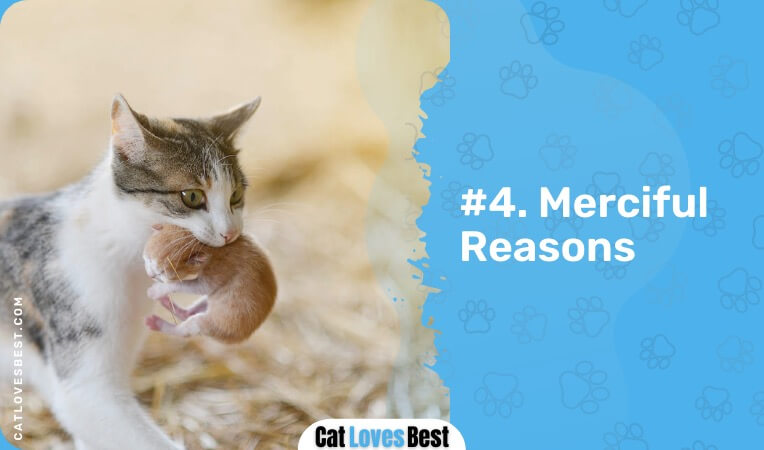
Another reason why do mother cats eat their kittens is if she gets the instinct that her litter is big enough, and she can’t produce enough milk for everyone, so she will eat a few of them to balance it out! Strange right?
But not just cats, even hamsters have such built-in instinct.
Well, pet cats are less likely to have such feelings of mercy, but you never know! To prevent this, all you can do is give your cat a very safe environment to reside in with zero interference from anyone or other pets in your home.
5. Cat with Low Body Fat: Malnourishment
This is so far the most shameful reason why do mother cats eat their kittens if you happen to be the pet parent. When mother cat feels that there’s a lack of nutrition due to low body fat.
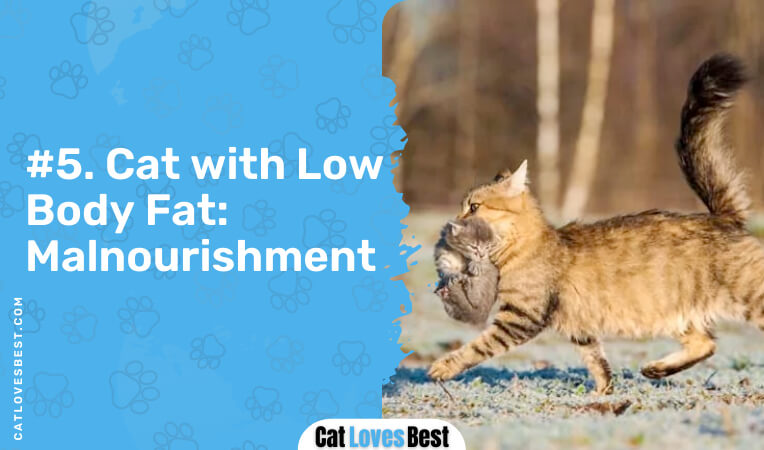
She will probably think that she can’t support her kittens or provide them with the necessary nutrients.
So she will eat one or two kittens or else all of them could die due to hunger. By eating one or two kittens, the mother cat will provide herself with enough amount of nutrients.
To prevent this from happening, you need to give your cat a proper and balanced diet from the very beginning, which will make her super healthy!
Or if you see that your cat is getting very skinny, even her ribs are showing out. You can also ask your vet for the best cat food options.
6. Scared Cat
It does sound very gruesome, but one of the reasons, Why Do Mother Cats Eat Their Kittens, is because they are scared. Though, this situation is more applicable to wild cats because they have to deal with a broader range of dangers, such as other wild animals or humans trying to hurt them!
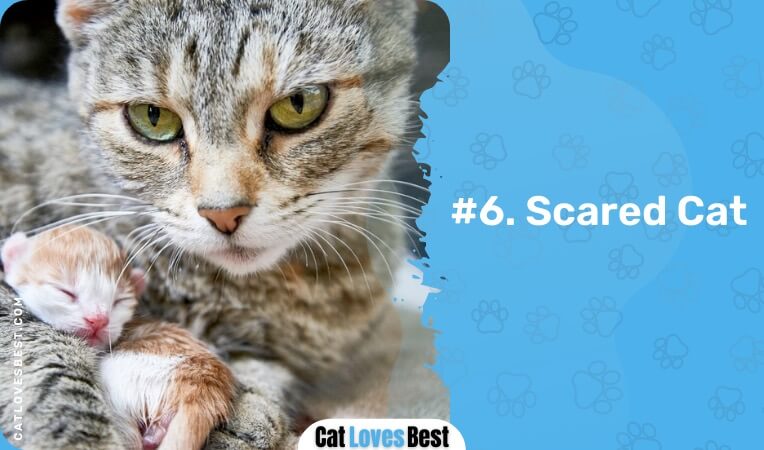
Usually, domestic cats are free from such fears, they will rarely try to eat their kitten due to this reason.
7. Feline Mastitis
Can feline mastitis be a reason why do mother cats eat their kittens? Yes, it can be. Well, let us first understand what is feline mastitis! The infection of the mammary glands is known as mastitis! Due to this condition, cats can face extreme pain while feeding their kittens.
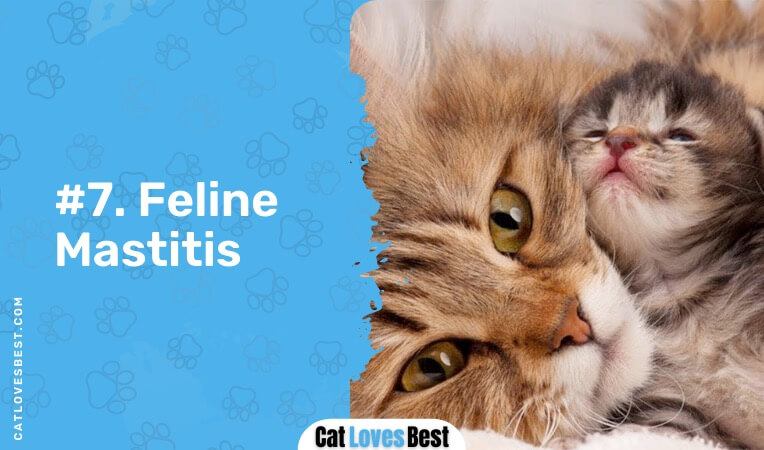
The terror just doesn’t end here, but a mother cat can also transfer the infection to her kittens while she’s nursing them, and it’s life-threatening for the kittens.
Mother cats with this medical condition will either ignore their kittens or they will eat them up! In the wild when she’s not producing any milk the mastitis gets cured as her milk production will dry up!
To save those little munchkins from getting killed brutally, you can separate them from the mother cat. And as soon as you see visible signs of your cat developing mastitis, you need to take her to the vet. Don’t wait and watch to see it getting worse.
What to Do If Your Cat Eats Her Babies?
This might sound super gross and as scary as it would look, but the reality is that it’s quite common for a few animals like cats, tho they would rarely do it.
Though you find it super evil and gross, it’s very natural for animals. You must be knowing that some animals eat the placenta right after they give birth! Indeed, mother bears, felines, canids, primates, and many species of rodents—from rats to prairie dogs—have all been seen killing and eating their young. So you need to first understand that it has nothing to do with the nature or upbringing of your cat.
Situations and some above-mentioned reasons, Why Do Mother Cats Eat Their Kittens, are for your knowledge.
So punishing your cats is a wrong idea and a big no!
- If your cat has eaten her kitten, you require consulting the vet right away.
- Once your cat is about to give birth, take proper care of her nutritious needs.
- Make a proper space for your cat to reside, maintain her privacy and restrict any human or other pet moment in that specific area.
- Last but not least important, pay attention to each and every red flag/warning.
Remember this is not applicable to every cat as it’s very unlikely to happen.
Conclusion
Yes, cats eat their babies! And not just cats but other animals such as bears, canids, primates, and rodents from rats to dogs all have been seen eating their young ones. The bottom line is it’s a natural behavior of animals!
Yet it is so rare! However, don’t punish your cat in any situation. Since we have provided you with so much knowledge, rectify the warning signs to prevent it from happening.
References
- Cat’s natural instincts — Michelson Found Animals
- Will male cats eat their newborn kittens? — Hyaenidae

